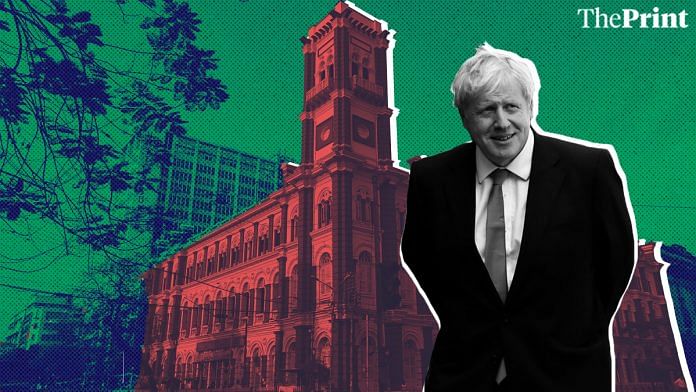On a chilly night in January 2017, I was standing outside the General Post Office, in the heart of Kolkata’s colonial district, Dalhousie Square. To most people on the road at 11 pm, nothing out of the ordinary was happening. But a closer look would have revealed white men in business suits dotting the square, and a handful of them were clustered around me.
These were Scotland Yard officers. Reinforcements trickled in discreetly, this time Indian police officers in plainclothes, some in business suits, others in dark safari suits – all taking up positions around the square. A Kolkata Police ‘pilot car’, adorned with red flags, suddenly came around the corner; behind it, a convoy of around 15 vehicles.
A bodyguard stepped forward to face the convoy and stuck his left arm out, indicating where the main car should stop. An officer opened the left passenger door.
“Good god Anthony, what the hell are you doing here?” said Boris Johnson, now the PM of the United Kingdom. He was the foreign secretary at the time.

Also read: What Boris Johnson’s Oxford Union presidentship run told me about the PM he will become
He was on an official visit to India, and had started his day by visiting PM Narendra Modi and then-finance minister Arun Jaitley before catching a flight to Kolkata to meet West Bengal Chief Minister Mamata Banerjee and her ministers, and attend to a few formal social engagements and dinner. The plan was that he would meet me by 10.30 pm. Except that his entourage got a call from Banerjee’s office – she wanted him to see her pride and joy, her brainchild, the sprawling 480-acre Eco Park in Rajarhat or ‘New Town’, the rapidly expanding suburb of the city.
I had been summoned to the British Deputy High Commissioner’s office a few weeks earlier and told that he was coming and that they would like me to show him around the city as I conduct tours in, and write about, Kolkata.
In nervous anticipation, the police officers and I bantered about my days at Met Police, or Scotland Yard as it is known, the senior managers we had in common and all those who had retired. The man we were expecting had his own clashes with the senior management of the Met Police, which is a dark chapter in London’s memory.
Also read: ‘Jester’ Boris Johnson is UK’s PM, now he has to keep the throne
BoJo, as Londoners know him, may come across as bumbling, witty and charismatic. But behind all the humour is a man armed with a degree in Classics from Balliol College, Oxford. Among his batchmates were former Prime Minister David Cameron and former foreign minister William Hague. But our paths crossed when Boris Johnson was the Mayor of London, only the second to have occupied that post.
As we strolled around Dalhousie Square, Boris and I reminisced about his mayoral days, although he kept interjecting by pointing out buildings, like the Writers’ Building, wanting to know their histories, taking detailed notes in a hand-sized notebook and a pencil – he was a journalist for 20 years, and it showed. His staff kept pace 10 feet behind us, a discreet but strong circle of men in suits.
Boris whizzed past Writers, which was the administrative headquarters of the East India Company, and later housed the West Bengal government secretariat. We then headed towards a narrow, urine-drenched lane, between the General Post Office and the Calcutta Collectorate Building. The lane is a garbage dump now, but this is where the ‘Black Hole of Calcutta’ was once. He asked why it stank of urine, my reply was that maintenance wasn’t great.
Probing questions and furious notes ensued. A brisk walk round to the Currency Building on the opposite corner and more questions about the missing dome, demolished by developers before the state government took it back, followed. Boris asked why it hadn’t been restored; I explained that nobody in India had the original blueprints. Instructions were mumbled to senior staff about pulling the blueprints from wherever they may be in the UK; they were to be sent to the government of India within a month. Boris left, but the blueprints never came.
But before he left, he shot a barrage of questions at me. He asked me what I thought of Modi and Jaitley, their policies in India. He then switched his questioning to Mamata Banerjee, seemingly impressed by her, concurring with my views on her making a substantial effort in her state. He didn’t seem entirely impressed with the central politicians, and didn’t mince his words about it either.
Also read: Boris Johnson gets his wish at last. Question is, can he actually wield power
Boris the boss
By the time he became the mayor in 2008, I had been in the Met Police for about eight years.
Boris and the police didn’t have a very good history. And I was once caught in the crossfire.
It was 6 July 2005 when we came to know that London would host the 2012 Olympics. The very next day al-Qaeda attacked London. Four suicide bombers killed 52 people. They hit us again on the 21 July, luckily their bombs failed, and all were arrested. Steering London, and the police itself, through all of this was Commissioner Sir Ian Blair.
The Met Police has a civilian oversight body, the Metropolitan Police Authority. Boris Johnson was determined to chair it himself, angering many in the police – there was no way a politician, whose office funded the police, was going to direct the Met Police. ‘Operational independence’ was sacrosanct to us.
Senior staff in the police began fierce, two-pronged negotiations. The first team looked at the possibility of any constitutional violations and if there were grounds for a legal challenge. The second team, the one I was in, back-channelled between cooler heads in the offices of the mayor and commissioner. Shouting matches, pub meetings, and papers being thrown about were standard practice for Boris – he was the mayor and he must have his way. Only when the threat of legal action loomed, he realised he was in a corner, but the fight wasn’t over.
Boris offered a compromise; the Chair would be held by him but he would appoint the deputy mayor for police, Kit Malthouse (now an MP and a contender for a ministerial berth with Boris as PM), to the position soon. In the end, it took two years for Boris to vacate the Chair for Malthouse.
A price had to be paid. Sir Ian Blair had to go. And so, Boris, a politician, slayed the commissioner of the Metropolitan Police Service, an act never heard of before or since. He could not dismiss Blair – the Met Police Commissioner is appointed by a panel chaired by the Home Minister and a few others – but he found a dirty way to push him out of his job – a press release saying he “had no confidence” in Blair, leaving Sir Ian Blair no choice but to resign.
Also read: Narendra Modi and Boris Johnson are linked by superpower fantasies
Boris the PM
Boris is cut from the same Right-wing cloth as Bolsanaro of Brazil, Modi of India, Putin of Russia and Trump of the US. Indeed, he has a lot in common with the latter – both born in New York, both US citizens (Boris has dual nationality), both blonde, both pandering to the exclusionists, both wanting hard borders.
Boris wants to get out of the European Union, no matter what, and he will chase the Brexit dream. But with the British finance minister, followed quickly by the foreign and then the international development minister resigning when Boris as PM became a certainty, the conspirators within his own party are already forming an alliance to oust him.
With the prospect of Scotland and Wales breaking away from the United Kingdom over Brexit, because the two want relations with Europe, and Northern Ireland facing a return to violence, a lonely, tiny England is all that might remain if Boris continues down this path. It is highly unlikely that even his own party members will allow him to clear a path that will end with this. It would be very surprising if BoJo survives a year as PM.
The author is an ex-Scotland Yard officer based out of London and Kolkata, and works as a historian and writer. His writings focus on governance, policing and politics. Views are personal.




I looked at the name…. glanced at a few lines… and wrote him off…. another 3rd world hater….. who wants me and mine DEAD I’m white.
My title for this piece: TWO SHITS AND A MISS
Also, the praise for Mamthadi’s antagonistic style like his gives me creeps. What has Mamtadi done for WB?
The fact he choose to meet a strong anti-Hindu leader and a Britisher based in Calcutta with access to be makes me wonder what is the dirty tricks dept. of UK government up to?
Boris can be a conservative and exclusionist – that’s great for UK and they have the right to choose their future. What bothers me is the guy comes to India on a short visit, but chose to spend time on Colonial past and choose Black hole of Calcutta. I didn’t expect him to go to Jalianwala Bagh, but this ? Is he holding a grudge on Indians for the loss of 136 or so colonists including their Indian servants? Anti immigrant mentality in most parts driven by economic fears, but racism is not. The right wing racism in India is primarily backlash of decades of minority appeasement. (The Democrats in US would be wise learn form so called Liberals of India). But this guy seems to be harping on the glorious pas of British Empire. He can be an intellect, but the Trump mode he is going is disastrous for Briton is not US.
The British are a pragmatic people. If Brexit proves to be the disaster many sensible people expect it to be, the British could always apply for readmission.